Many thanks to Darb Ryan for creating this video of our recent Mountain Bike Ride over the D’Aguilar Range from Ferny Grove to Walloon via Mt Nebo and Fernvale.
Ferny Grove to Walloon via Goat Track and Fernvale from Darb Ryan on Vimeo.
Many thanks to Darb Ryan for creating this video of our recent Mountain Bike Ride over the D’Aguilar Range from Ferny Grove to Walloon via Mt Nebo and Fernvale.
Ferny Grove to Walloon via Goat Track and Fernvale from Darb Ryan on Vimeo.
We’re lucky to live near two artificial lakes: Lake Kurwongbah which was created when Sideling Creek was dammed in 1955, and Lake Samsonvale which was created when the North Pine River was dammed in 1968.
I love riding the bike by these large bodies of water.
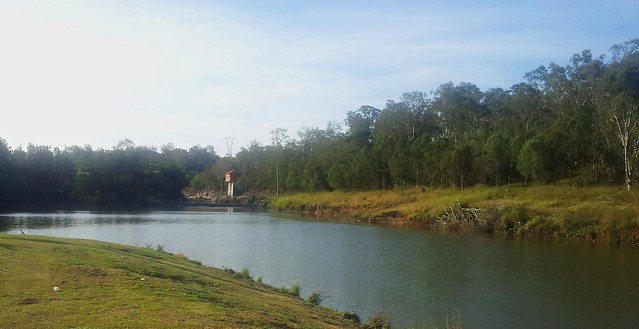
The Pump House was built in 1955 as part of the construction of the Lake Kurwongbah Dam. It pumps water uphill into Lake Kurwongbah from the North Pine River to keep the Dam topped up.
Lake Kurwongbah was oriiginally built to supply water to the Australian Paper Manufacturers (APM) Petrie Mill – now known as the Amcor Cartonboard Petrie Mill.
Today if you walk along the Dam Wall at Kurwongbah you’ll often see a mass of air bubbling up to the lake surface. This is because the Pump House is operating, transferring water into Lake Kurwongbah. (It’s also a good reason not to swim in the river near the Pump House!)
[Source: "Pioneering the Pine", Leith Barter. 2005]
If you look carefully you can see a pelican drifting on Lake Samsonvale. I watched this one gliding in like a strangely shaped flying boat from years gone by.
It doesn’t get much better than this! There are a lot worse things you could do than wander along the shoreline of Lake Samsonvale ![]()
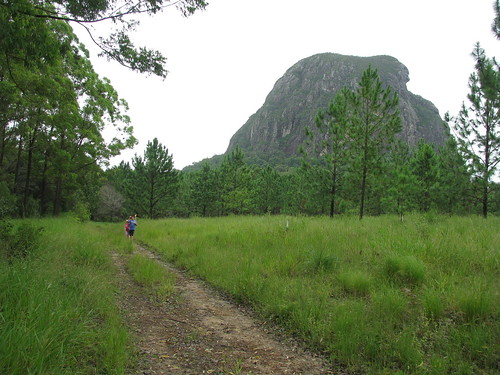
The Rocky Giant hunches with his face towards the sea
And his heart is filled with aching from an ancient tragedy
That happened in the dreamtime when the land was fresh and young
And his burning anger separated Tibro from his son.
But he holds a darker sorrow that he longs to should out loud -
Someone else’s precious son is waiting to be found.
And Tibrogargan comforts him: “Peace. You’re not alone -
My family of mountains will help to bring you home”.
The pregnant Mother Beerwah has been waiting to give birth
But it takes an age for mountain babes to rise up from the earth.
And as she waits she worries over all her Glasshouse brood
And hopes that they’ll grow safe and strong (as all young mountains should)
She watches while they frolic all about her feet each day
And she notices another child has joined with them in play.
Another mother’s son is lost: “For how long have you roamed?
Stay here with us until it’s time for you to go back home”
The Gubbi tell the story of Glasshouse woes and fears
Why all the creeks flow constantly with bitter mountain tears:
An ancient storm; An argument; A son who went astray -
An absent child; An aching void that never goes away.
The mountain spirits kept their word, their sacred task is done
With ancient love and tenderness for someone else’s son.
And so today the Glasshouse creeks are flowing with fresh tears
For Daniel’s coming home at last: he’s waited eight long years.
Neil Ennis, August 2011
In memory of Daniel Morcombe, and in gratitude for the comfort we can draw from the dreamtime legends of the Gubbi Gubbi / Kabi aboriginal people.
Over the last month or so I’ve been planning a ride over the D’Aguilar Range with a few friends. We had arranged for about 15 people to do the ride today, but it started raining a few days ago, which meant most people didn’t want to do it due to the weather.
Despite the rain, five of us decided we’d give it a go today anyway. After all, fortune favours the brave, and as Woody Allen once said, 99% of success is simply turning up.
So we set off on our bikes from Ferny Grove Railway Station shortly after 7am, hoping to arrive back their later in the day by train.
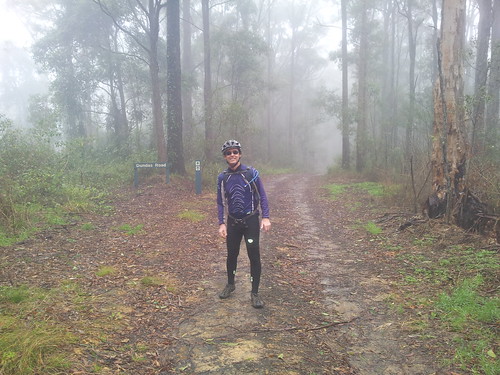
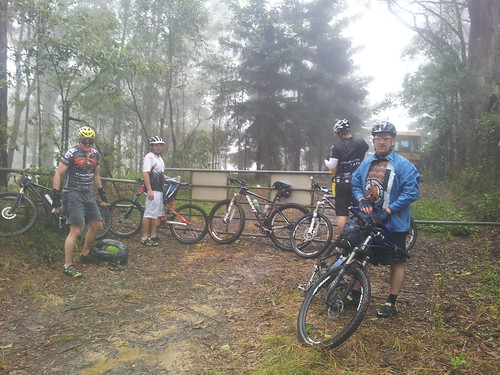
This time I think our determination paid off. The rain didn’t really hassle us too much until we got to the misty high-point of the trip at the top of Dundas Road near Mt Nebo.
From there the track became steep and muddy. The rangers have taken a grader along the fire trail recently to smooth it out. This is normally a good thing, but in the current wet weather it made the trail loose and muddy with a consistency in some parts similar to peanut butter. Some of the descents are steep, and I think we did well to keep the bikes under control and not fall off.
By the time we got to Fernvale, the bikes were caked with mud, and the chains were clogged with grit.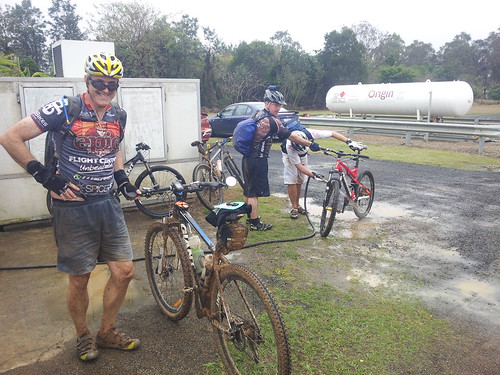
Darb had a brilliant idea to hijack the firehose at the local petrol station (after asking them first) and blast the mud off the bikes. I think each bike lost a couple of kilograms of weight in the process.
From there we followed a few of the quieter gravel roads south to Walloon. The rain got heavier, the roads got muddier, and we eventually rolled into Walloon dirty, drenched, cold and thirsty.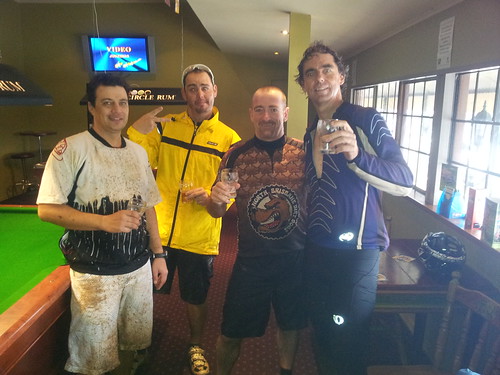
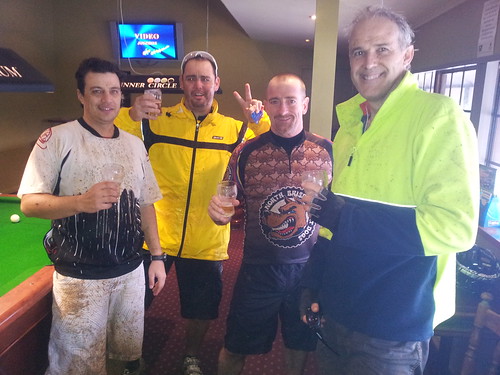
I read somewhere that beer is one of the fastest drinks to re-hydrate and replace minerals lost due to hard work. I don’t know if it’s true or not, but we decided it would be worthwhile trying it out. I think we agreed.
The ride was trickier due to the rain, but easier because we avoided the “Wall of Dirt” due to the wet weather. Almost 70km, about 1,350m ascent / descent and 3,900 kcal. On the tough-o-metre I’d still give it 9 out of 10.
The ride today started out as an experiment to see how long it took to ride from home to Ferny Grove via Bunyaville. (An hour as it turns out). But after that it turned into a hillfest. I decided to pit myself against the short-steep climb up Camp Mountain. In the past I was intimidated by it, but today I gave it my all, and surprised myself by conquering the hill.
I was yelling at myself towards the end (I must have sounded crazy) “Get Up!” “Come on!” “Go!”. And it seemed to work. I gave it everything I had, and nailed that monster of a hill for the first time. It feels fantastic to slay a big hill – doing something that you thought you might not have been able to do.
From there I headed up the mountain towards Scrub Road….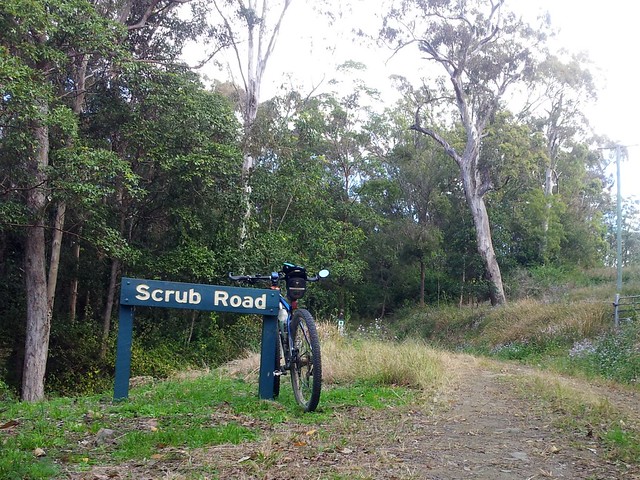
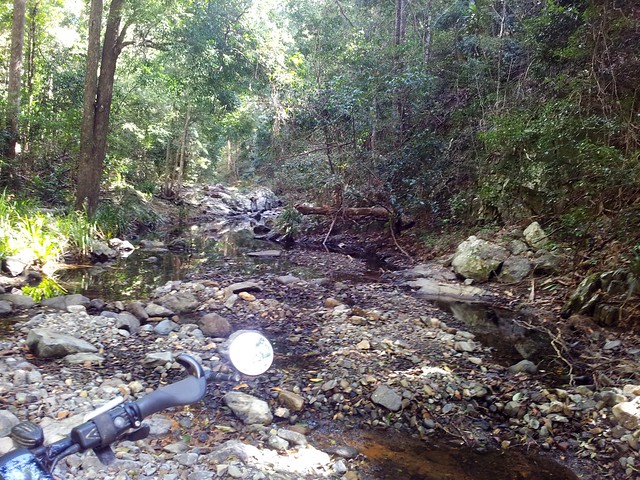
Scrub Road is an easy way to get from the bitumen on Mount Nebo Road, into the Forest. It’s a fairly steep descent down to the pretty creek, and then a long slow climb up to the shelter and water tank on South Boundary Road.
The wattle blossoms on South Boundary Road look beautiful, and smell fantastic.
South Boundary Road runs from Mount Nebo down almost to The Gap.
It has some fun smooth descents, beautiful forests and raucous birds.
I always love riding this trail.
All up, 80km, 4,700kcal, and about 1,600m of ascent. On the tough-o-metre, this one gets 9 out of 10 because of the distance, and the climb up Camp Mountain.
There are two dams near here: Lake Samsonvale, built on the North Pine River; and Lake Kurwongbah built on Sideling Creek.
In the past I lamented the local history that was lost under the water of the dams, but in today’s late winter weather, I delighted in the beauty of the lakes.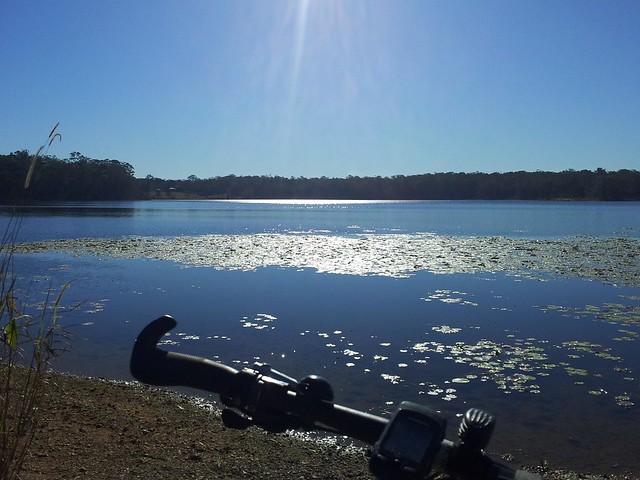
“Kurwongbah” was the name the Turrbal people gave to Sideling Creek. It was dammed in the 1970′s to provide water for the local paper plant. The authorities named the resultant lake “Kurwongbah” as well.
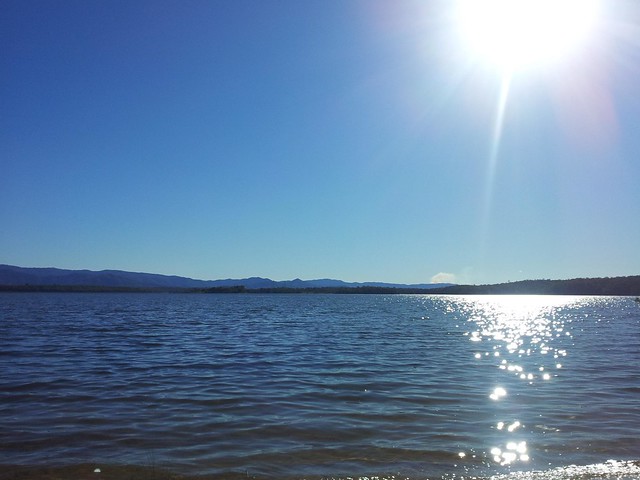
Lake Samsonvale, looking west towards Mount Samson and the D’Aguilar Ranges.
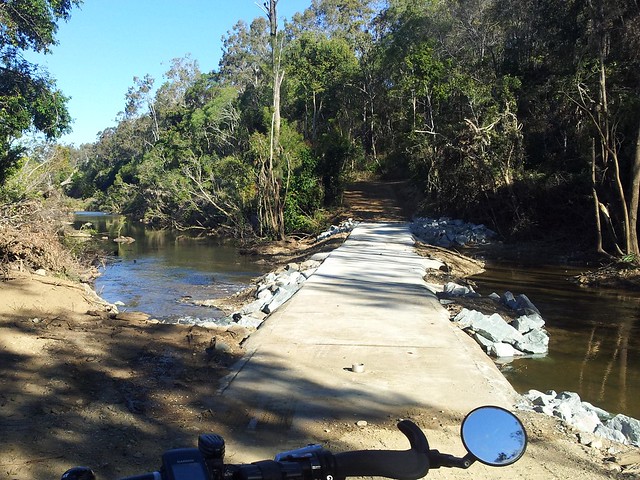
This pedestrian river crossing was washed away by the January Floods, and has only recently been repaired. It’s a pleasant way to get across the river from the Pine Rivers Pony Club up to Camp Warrawee. To whoever fixed it, thank you!
I’m so grateful to live in such a beautiful place.
This morning I rode from Lawnton to Walloon (west of Ipswich) via Samford, Mt Nebo and Fernvale. This was one of a series of exploratory rides to check out some tracks in the western part of D’Aguilar National Park to make sure they were ok to bring a group of riders through in a few weeks.
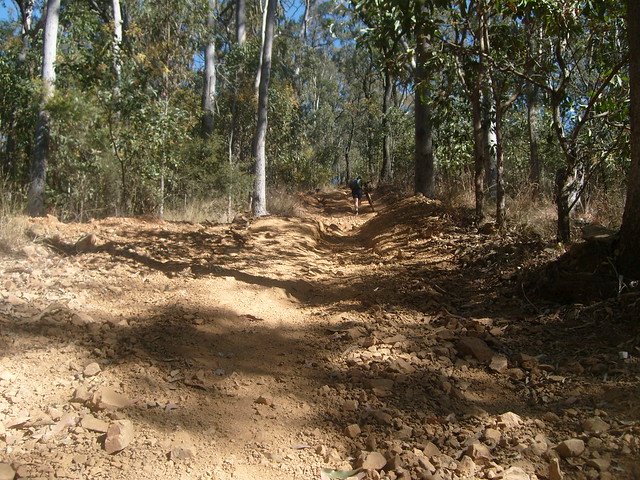
One of the guys on the MTBDirt forum christened this hill “The Wall of Dirt”. It’s on the “Carbould Loop” trail at Banks Creek. You can’t ride up it. It’s pretty scarey riding down it. And there’s no (legal) way around it ![]() So any trip west from this part of the forest includes this hill. Dont’ worry, though. Even though it’s steep, it only goes for about 200 metres.
So any trip west from this part of the forest includes this hill. Dont’ worry, though. Even though it’s steep, it only goes for about 200 metres.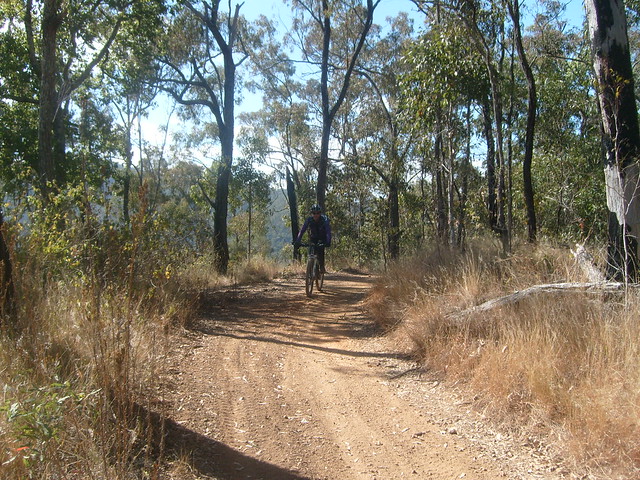
It’s not all steep trails. Some of the tracks have amazing views on both sides. It’s a beautiful place to ride.
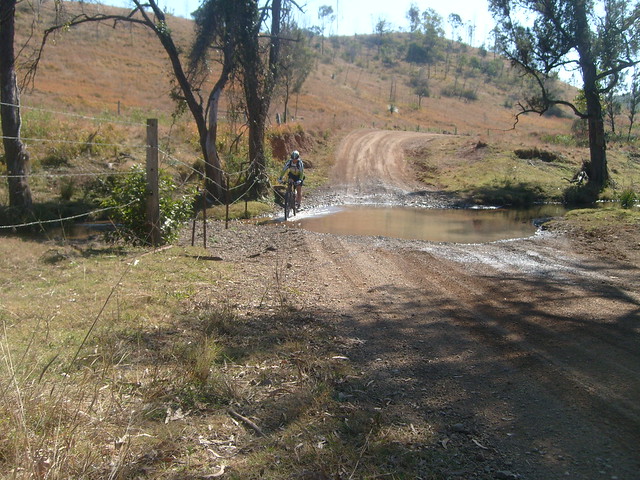
The trail eventually comes out on Banks Creek Road – a quiet gravel road out the back of Fernvale. It has lots of creek crossings, so it could be impassable in wet weather.
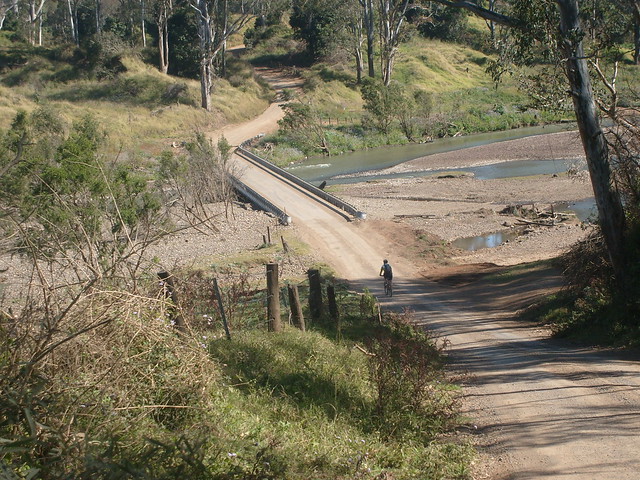
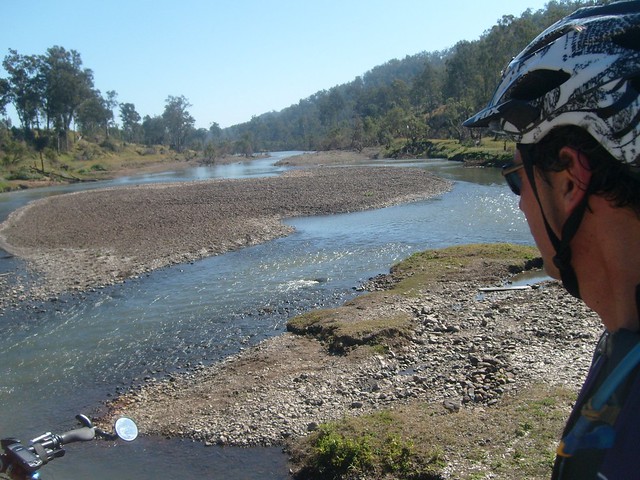
The upper reaches of the Brisbane River flow quite rapidly through Savages Crossing. I’m told the banks of the river had a lot more vegetation than this, but most of it was ripped away during the January floods.
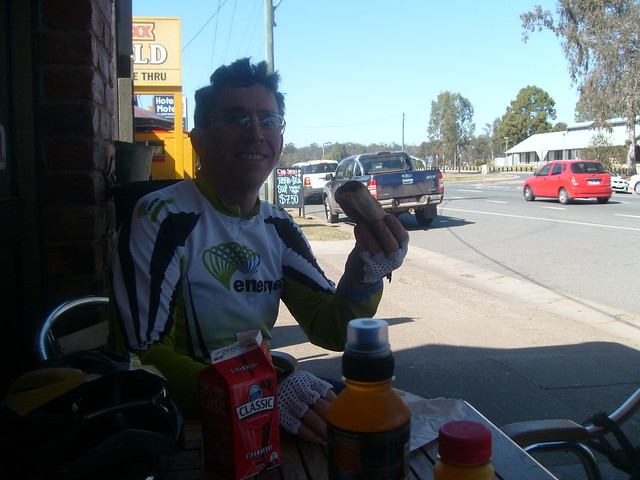
After a tough ride through D’Aguilar National Park, Dean thinks a sausage roll and something sweet really hits the spot.
Total distance: 82km, with just over 1,600m of vertical ascent and 4,400kcal of energy in about 5 hours. 8 out of 10 on the tough-o-meter because of the Wall of Dirt and the distance.
Incidentally, we caught the train back from Walloon – a 2 hour trip. I got to use my Go-Card for the first time and was pleasantly surprised that it only cost me $4.85 to travel 80km on the train.
I decided it was time for a long overdue visit to Deepwater Bend at the mouth of the Pine River and the surrounding wetlands. The Wyampa people called the thick Mangrove Swamps “Tinchi”, and the awkward looking long-legged birds that poked around in the mud “Tamba”, which is why the Brisbane City Council named these wetlands “Tinchi Tamba”.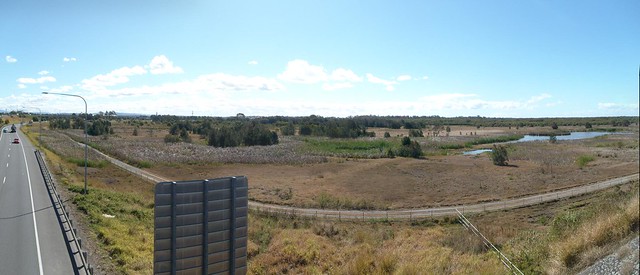
Most of the coastline near Brisbane along Moreton Bay was a wetland environment. Today the most of the northern section of the Gateway Motorway is bordered by the wetlands on one side or another as it winds its way between the Pine River in the north to the Brisbane River in the south.
Deepwater Bend is a great spot for a picnic or cast a line in for a spot of fishing. There are some great views westward to the D’Aguilar Ranges.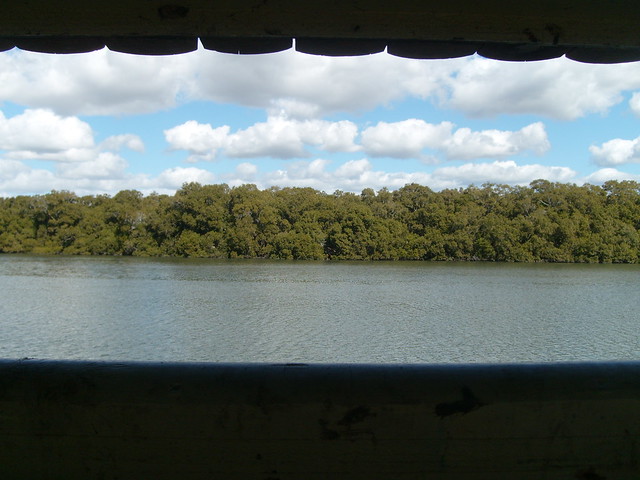
On the bank of a nearby creek there’s a “Bird Hide” which allows you to watch the local birdlife without them seeing you. In a few weeks this water will be teeming with migratory birds as they make their way back south to breed.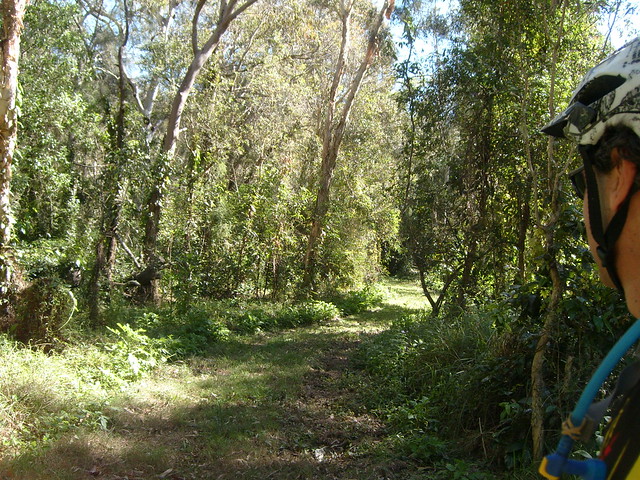
The Tinchi Tamba wetlands are criss-crossed by a network of trails. One of them headed off into some thick swamp forest, so I thought to myself “Why not?” and rode off to see where the trail went.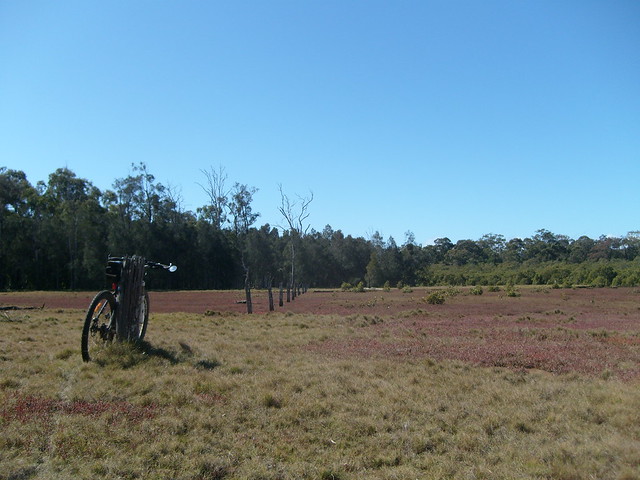
As you can see from the old fence posts, this whole area used to be farmland. These days you won’t find any cattle, but you’ll find hundreds of kangaroos and birds.
There is a report that the local Kangaroos can swim.